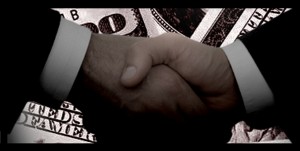NIAC and Trita Parsi’s peace business
Nov 20th, 2013Hassan Dai, 20 November 2013
 NIAC continues to slander US politicians who oppose Tehran’s agenda and call them warmongers but NIAC’s internal documents released during the lawsuit (that NIAC lost), show clearly that its pro-Tehran lobby is only about business and opening up trade between US and Iran. The peace mantle is just a disguise and human face for its lobby
NIAC continues to slander US politicians who oppose Tehran’s agenda and call them warmongers but NIAC’s internal documents released during the lawsuit (that NIAC lost), show clearly that its pro-Tehran lobby is only about business and opening up trade between US and Iran. The peace mantle is just a disguise and human face for its lobby
———————————————————————————————–
The National Iranian American Council (NIAC) and its president Trita Parsi have launched a full-fledged campaign to advance Tehran’s agenda in Washington. NIAC smears and slanders US politicians who oppose Mullahs’s agenda and calls them warmongers and stooges of AIPAC. Then, NIAC is presented as a symbol of peace and defender of US national interests.
NIAC is a Washington based lobby organization that fights for the removal of sanctions against the Iranian regime. The Governmental press in Iran considers NIAC as the “Iran lobby” in Washington. (Read NIAC fact book)
The lawsuit that Trita Parsi and NIAC filed and finally lost against one of their critics, and the review of their internal documents released during the lawsuit show that their lobby has always been about business and opening up trade between US and Iran. The peace mantle is just a disguise and human face for his lobby. In 2002, when Parsi founded NIAC he wrote a memo to his partner and Washington lobbyist Roy Coffee and explained the real nature of his lobby and why this lobby should get a “human face”:
“Although the mission of the proposed lobby should be to improve relations between the US and Iran and open up opportunities for trade, the initial targets should be less controversial issues such as visas and racial profiling/discrimination… Despite its predominantly business oriented constituency, it is essential that the lobby creates a “human face” for its aims and goals. AIPAC successfully painted the opponents of the Iran Libya Sanctions Act as “greedy businessmen who had no scruples when it came to doing business with terrorist regimes.” The oil companies failed to characterize their campaign with “human concern for the well-being of innocent Iranians stuck with a dictatorial regime” or “support for the poor mid-Western family father who lost his job due the sanctions. The human element is essential both when it comes to attracting support among Iranian-Americans and when it comes to winning the debate and the votes on the Hill.”
NIAC internal documents show that Parsi was working for and being paid by Atieh Bahar, an Oil consulting company in Tehran with close ties to the regime. Parsi coordinated his lobby with Siamak Namazi, who was Atieh Bahar’s partner and managing director. (See report: “ NIAC’s partners in Iran: Iran’s economic mafia and regime associates.”)
NIAC and Parsi have continued a joint lobby with USA-Engage representing large US corporation to lift the sanctions against Iran.
Trita Parsi has used his contact with the Iranian regime’s officials as a business asset. In 2006 after meeting Javad Zarif, the regime’s ambassador to the UN, he launched “Iran negotiation project” for which he asked nearly $100.000 to be shared with Gareth Porter (another so-called peace activist). In an email explaining his project, Parsi wrote: “Few analysts in Washington have the access of Dr. Parsi to decision makers in Iran.”
NIAC’s peace business can surely seduce some in Washington, but the Iranian-Americans disdain this organization that uses peace and friendship as a pretext to advance the interests of Iranian regime.
Note: To understand how NIAC and the Iranian regime have used the US anti-war groups in their lobby campaign, read the report: Relation and cooperation between Iranian regime and American anti-war groups.

